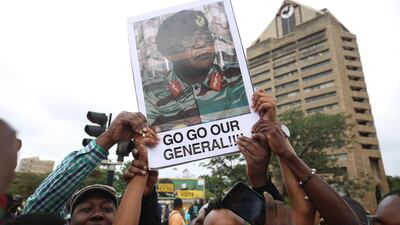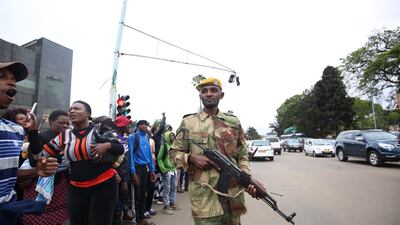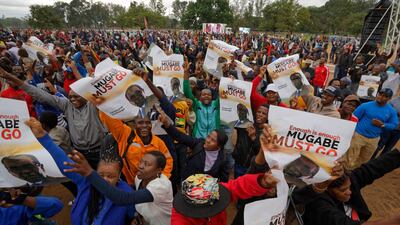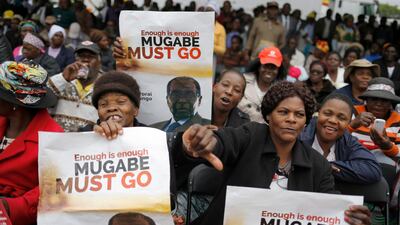President Robert Mugabe's own ruling ZANU-PF party wants him to step down and plans to hold a rally in Zimbabwe's capital Harare on Saturday to make the point.
Mr Mugabe, who has ruled Zimbabwe since independence from Britain in 1980, faces the starkest challenge ever to his rule after the army seized power on Wednesday, saying it was targeting "criminals" around the nonagenarian leader.
On Friday, ZANU-PF called for Mugabe to resign, the main state newspaper The Herald reported -a clear sign that the aged leader's authority has collapsed after the army takeover.
The newspaper said ZANU-PF branches in all 10 provinces had met and had also called for Mugabe's wife Grace to resign from the party. It was her ambitions to succeed her husband that triggered the political crisis.
A senior member of ZANU-PF said the party wanted their long-time president gone.
"If he becomes stubborn, we will arrange for him to be fired on Sunday," the source said. "When that is done, it's impeachment on Tuesday."
The Herald reported that ZANU-PF would convene a special Central Committee meeting on Sunday to "realign the revolutionary party with current political developments".
Pointedly, the military said it "fully supports" a "solidarity march" — apparently separate from the ZANU-PF event — in the capital, Harare, on Saturday, part of an apparent groundswell of anti-Mugabe sentiment unleashed by the dramatic events of the past few days. The army said it had been "approached by several private volunteer organisations seeking to freely move and express their desires" and they could do so if they were orderly and peaceful.
Harare has been calm as the coup has unfolded but the armed forces also issued a warning against looting.
The army appears to want Mugabe to go quietly and allow a transition to Emmerson Mnangagwa, whose sacking last week as vice president sparked the army action.
One goal the generals have is to prevent Mr Mugabe from handing power to his wife, Grace, 41 years his junior, who appeared on the cusp of power after Mr Mnangagwa was pushed out.
Mugabe, 93, who calls himself the grand old man of African politics, appears to be running out of options. The army is camped on his doorstep. Grace Mugabe is under house arrest and her key political allies are in military custody. All the main pillars of Mugabe's rule have turned on him or have offered no support.
The police have shown no resistance, while Chris Mutsvangwa, the leader of Zimbabwe's influential war veterans, said on Friday that Mugabe would not be allowed to resist the military and remain in power. And now ZANU-PF, which built a cult of personality around its leader, has deserted him.
Mr Mugabe is revered by some as an elder statesman and independence leader but also reviled by many in Africa and abroad who accuse him of resorting to violence to retain power while running a once promising economy into the ground.
The economy collapsed after the seizure of white-owned farms in 2000. Unemployment is now running at nearly 90 per cent and chronic shortages of hard currency have triggered inflation, with the prices of imports rising as much as 50 per cent a month.








